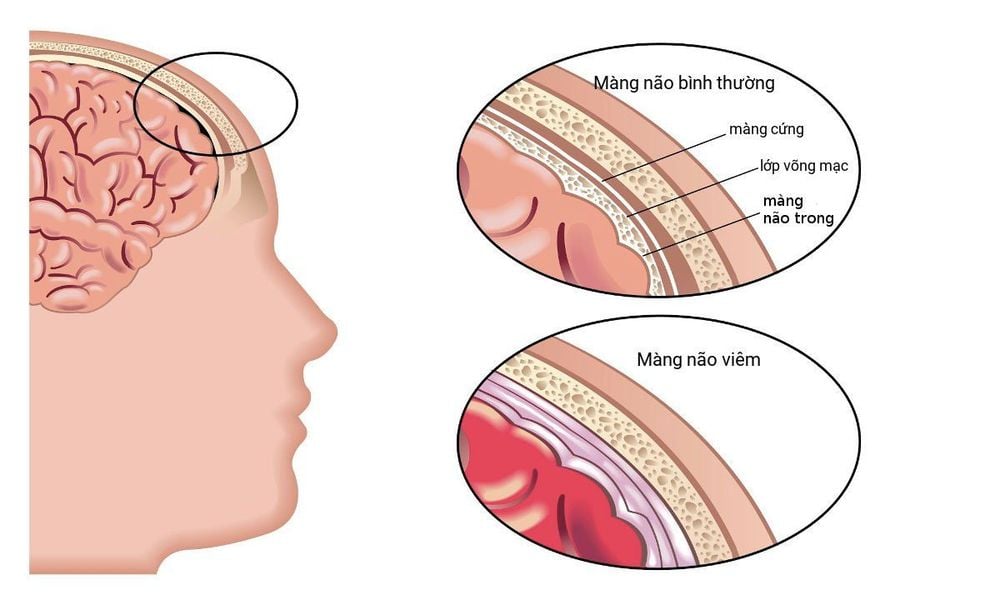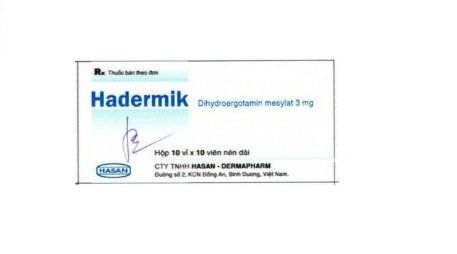This is an automatically translated article.
Dizziness is a symptom that many people experience. Headache can be a sign of a certain disease and is often accompanied by a number of other symptoms such as dizziness, headache, nausea, dizziness, headache, dizziness, fatigue.1. Headache, dizziness, fatigue
When there is a headache, dizziness, the patient will feel that everything around him rotates, the tables and chairs move, the house collapses, in some cases, it is also accompanied by nausea, fatigue, ... This makes many people worry and the headache of dizziness is getting worse. There are many causes of dizziness and fatigue.
2. Cause
Headache due to hypertension High blood pressure headache is common in people with hypertensive disease, accompanied by factors that are often stressed, stress at work, life, the risk of headaches the higher. This headache usually comes on suddenly and is intense. The headache is localized in multiple occipital and frontal regions. Patients have a feeling of stiffness in the muscles of the neck, pain on the top of the head and can spread to the forehead, the pain often hurts more at night. The cause of headaches in patients with hypertension is pressure. The constant force of blood flow on the vessel wall increases and causes the vessel wall to gradually dilate and lesions appear. In the brain, these lesions increase in the small blood vessels that cause headaches. If left for a long time, the disease can easily cause complications such as cerebral vascular occlusion. High blood pressure patients need to be alert to headaches, to prevent dangerous complications that may occur.
Brain Tumor Headaches Brain tumor headaches are caused by increased intracranial pressure. In the early stages, the headache is usually dull, and long-lasting. In the later stages, in addition to headache, the patient also has some symptoms such as nausea, decreased vision or focal neurological signs such as limb paralysis, cranial nerve palsies, and blurred vision. This is a constant headache that is severe and the pain does not go away with medication.
Meningitis headache

Viêm màng não có thể là bệnh do virus, vi khuẩn hoặc các tác nhân ký sinh trùng, đơn bào hoặc nấm gây nên
Meningitis can be caused by viruses, bacteria or parasitic, protozoan or fungal agents. This is a common disease in children, the disease has a quick onset and is difficult to detect because babies often do not know how to describe their illness. If caused by a virus, the disease can be cured within a few days, but if it is caused by bacteria, the patient's health may worsen.
Headache is a symptom of meningitis. Initially, the headache is only moderate but the intensity will gradually increase. After that, the patient felt a severe headache, taking medicine did not help, and accompanied by symptoms of stiff neck, vomiting, photophobia, and high fever.
Headache caused by cerebral vascular malformation Cerebral vascular malformation is a phenomenon where abnormal and disordered blood vessels in the brain. These vascular malformations, when ruptured, cause bleeding in the brain.
Cerebrovascular malformation is a congenital disease, which is an abnormal connection between arteries and veins in the body. Cerebral blood vessels in the area of the brain are often divided into small branches. At a certain point, the blood vessels will branch into many small vessels called capillaries. Capillaries are about the diameter of a blood cell, and about one-fifth the size of a human hair. Normally in the human body there are many capillaries, the flow and pressure inside the capillaries are very low.
Cerebral vascular malformation can cause cerebral hemorrhage, seizures, severe cases can lead to coma and death. If you are young or suffer from severe headaches, have been to the doctor and used many medications to no avail, you may have a cerebrovascular malformation. In this case, a brain angiogram is needed to confirm the diagnosis. Headache, dizziness is one of the symptoms of cerebrovascular malformation. The headache is dull, persistent, sometimes it will flare up with intense pain, maybe even accompanied by tremors.
Cerebrovascular malformations can be diagnosed through brain magnetic resonance imaging (brain MRI). After the vascular malformation is detected, there will be a further evaluation that needs to be done, which is cerebral angiography (brain Angiogram). Cerebral angiography helps the doctor to have an accurate view of the position, size, and shape of the malformed vascular segment, and at the same time to chart the blood vessels where the malformed blood vessels arise.
Currently, there are three methods to treat cerebrovascular malformations including: traditional open surgery, radiosurgery, minimally invasive vascular ligation surgery, and vascular ligation. Vasectomy is more widely used in the treatment of cerebral vascular malformations. The advantage of this method is that the doctor can completely block the malformed blood vessel with many different materials, prevent blood from circulating through the malformed vessel, minimize the possibility of blood loss and increase safety. Patients can be discharged the same day or one day after surgery.
Hemorrhagic headache is a sudden type of headache, terrible pain, can even lead to hemiplegia and rapid coma. Hemorrhagic stroke is a disease of sudden and intense onset. Patients can have a brain hemorrhage during work, normal activities, and even while sleeping.
3. Prevention of dizziness headache
To prevent headaches, besides taking medication for any cause, patients also need to pay attention to therapies such as:Lifestyle changes: The first thing to apply is to have a healthy diet. and keep a healthy weight under control. Adjust portion sizes to avoid foods that can trigger migraines such as chocolate, cheese, alcoholic beverages, carbonated drinks, crabs, fish, snails, shellfish, shrimp, etc. Have an effective way to work Always Keeping a comfortable mind is the best medicine to prevent disease. Practice sports every day for example, walking, yoga, tai chi, qigong

Ngủ đúng giờ phòng tránh viêm màng não
People who regularly smoke, drink alcohol, and are obese... are often more prone to headaches than the average person. If stress cannot be avoided in life, learn how to better overcome and deal with stress by reducing work pressure, avoiding stress, and trying to keep yourself an optimistic spirit. Learn how to relax, do light exercise before going to bed to have a better sleep, arrange your work to try to sleep on time, avoid sleeping too much during the day to get a good night's sleep and prevent rapid headaches. effective side.
When there are abnormal headache signs, it is necessary to go to medical facilities immediately for diagnosis and timely intervention methods.
At Vinmec Times City International Hospital, the department of neuroendocrinology belongs to the clinical medicine division, holding specialized functions in the examination and treatment of diseases related to the central nervous system including: Skull , brain, cerebrospinal vessels, meninges, intracranial nerves, pituitary gland, spine, discs, spinal membranes, and peripheral nervous system (nerves and ganglia outside the brain and spinal cord).
Together with a team of leading specialist doctors in the country, not only good in expertise but also rich in many years of experience and modern equipment and advanced facilities.
Please dial HOTLINE for more information or register for an appointment HERE. Download MyVinmec app to make appointments faster and to manage your bookings easily.













